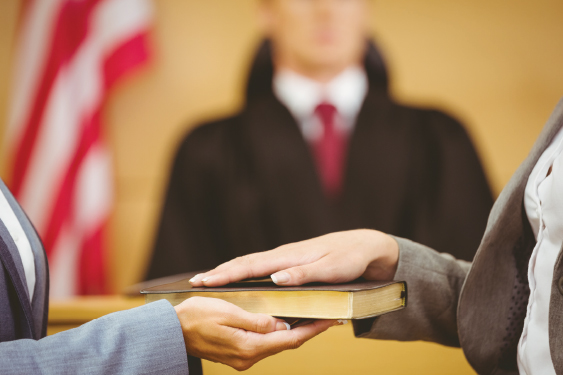
Thaddeus Mason Pope, JD, PhD
Hundreds of oncologists are working “side gigs” as expert witnesses in a wide range of medicolegal settings. With increasing conflict related to liability and insurance coverage, the demand continues to grow for objective physicians who are not involved in a specific case, have no personal interest in the outcome of the case, and have expertise in the matter being litigated. Should you become an expert witness in a legal proceeding? To help inform your decision, we have outlined key advantages and disadvantages of becoming an expert witness in a case.
Pros: Reasons to Be an Expert Witness
There are three main reasons to be an expert witness in a legal dispute. First, oncologists have an ethical responsibility to facilitate legal and regulatory proceedings concerning cancer. Dozens of medical societies’ ethics codes and position policies state that the public interest requires clinicians to serve as expert witnesses.1 For example, the American Medical Association Code of Medical Ethics states that “as citizens and as professionals with specialized knowledge and experience, physicians have an obligation to assist in the administration of justice.”2 Like voting and jury service, being an expert witness is part of what it means to be a good citizen.
Given the wide variety of legal and regulatory proceedings, most expert witnesses do not testify against other clinicians.— Thaddeus Mason Pope, JD, PhD
Tweet this quote
Second, in addition to fulfilling your civic duty, serving as an expert witness can be lucrative. On average, oncology experts charge $500 per hour, and some charge more than $1,000 per hour.3 Most of these hours are billed at home during evenings and weekends. Yes, expert witnesses must occasionally testify in a deposition or at trial. But the work primarily entails: (1) evaluating prospective cases; (2) reviewing records and depositions; (3) preparing a report; and (4) discussing the case with counsel.
Third, serving as an expert witness can be both educational and rewarding in non-financial ways. For example, you can learn about medical charting errors that can improve documenting abilities in your own practice.4 You can also provide much broader benefits by elevating the level of the practice of medicine and by protecting public health, for example, by helping to remove harmful consumer products from the market.
Roles of Oncology Expert Witnesses
What exactly will you do as an expert witness in a case? Oncology expert witnesses serve in a variety of legal and regulatory tribunals. Perhaps the best known is medical malpractice litigation. Here, experts are essential to helping the judge and jury understand the relevant standards of care; whether the defendant followed them; whether the defendant’s alleged negligence caused the patient’s injuries; and the extent of those injuries in terms of prognosis, future care needs, and life expectancy.

Malpractice cases aside, oncology experts are also instrumental in testifying in product liability cases. For example, they have been key players in Johnson & Johnson talc-safety lawsuits alleging that asbestos in Johnson & Johnson’s baby powder causes ovarian cancer and mesothelioma. In just the first several cases, juries have already awarded plaintiffs more than $5 billion.5 Oncology experts have also been critical to cases alleging that Monsanto’s Roundup weed killer causes non-Hodgkin lymphoma. Other oncology experts are working on cases alleging that cellphone use causes brain cancer and that diabetes medications containing pioglitazone cause bladder cancer.
Further, oncology expert witnesses also assist in insurance coverage disputes, billing fraud cases, peer review hearings, warning label cases, worker’s compensation claims, and health-care licensing board investigations. Survey evidence shows that some expert medical witnesses are reluctant to testify against other clinicians.6 However, given the wide variety of legal and regulatory proceedings, most expert witnesses do not testify against other clinicians.
Cons: Reasons to Consider Not Becoming an Expert Witness
What does it take to become an expert witness? Because expert witnesses serve in a variety of roles, there is no core set of essential qualifications. Generally, they must have education, training, or experience on the matter in question. In many states, expert witnesses must have the same credentials as the defendant clinician, and they must be familiar with the standard of care in the geographic area where the defendant practices.7
Although not all expert witnesses testify under oath, those who do must be able to withstand the pressure and stress of cross-examination by opposing counsel.— Thaddeus Mason Pope, JD, PhD
Tweet this quote
Expert witnesses must have a flexible schedule, so they can respond to unpredictable litigation deadlines. They must be able to communicate clearly, both orally and in writing. They cannot have credibility “baggage,” such as past medical board discipline or revocation of staff privileges. Finally, although not all expert witnesses testify under oath, those who do must be able to withstand the pressure and stress of cross-examination by opposing counsel. In particular, they cannot be overly sensitive to criticism or insults.
Growing Regulation of Expert Witnesses
Although they are often retained by one party in a dispute, expert witnesses are not “hired guns.” They must provide opinions that are unbiased, scientifically valid, clinically accurate, and otherwise truthful. Expert witnesses advance the administration of justice only when the opinions they provide are fair, impartial, and based on good science. Therefore, numerous public and private entities now regulate expert witnesses to ensure that they act with honesty and integrity.
Increasingly, expert witnesses who offer unsubstantiated opinions are subject to discipline and sanctions from professional organizations, state licensing boards, specialty boards, and their own institutions. Expert witnesses can be subject to civil liability or even criminal prosecution for perjury.8 Therefore, before becoming an expert witness, consult guidelines from the entities to which you are accountable and confirm that you can comply with them. ■
Dr. Pope is Director of the Health Law Institute and Professor of Law at the Mitchell Hamline School of Law in Saint Paul, Minnesota (www.thaddeuspope.com).
Editor’s Note: The Law and Ethics in Oncology column is meant to provide general information about legal topics, not legal advice. The law is complex, varying from state to state, and each factual situation is different. Readers are advised to seek advice from their own attorney.
Disclaimer: This commentary represents the views of the author and may not necessarily reflect the views of ASCO or The ASCO Post.
DISCLOSURE: Dr. Pope reported no conflicts of interest.
REFERENCES
1. American College of Physicians: Guidelines for the physician expert witness. Ann Intern Med 113:789, 1990.
2. American Medical Association: Code of medical ethics, opinion 9.7.1. Available at ama-assn.org/delivering-care/ethics/medical-testimony. Accessed August 5, 2019.
3. SEAK: Expert witness fee study. Available at seak.com/expert-witness-fee-study. Accessed August 5, 2019.
4. DocG, MD: The good, bad, and the ugly of being a medical expert witness. May 24, 2018. Available at www.kevinmd.com/blog/2018/05/the-good-bad-and-the--ugly-of-being-a-medical-expert-witness.html. Accessed August 5, 2019.
5. Drugwatch: Talcum powder verdicts & settlements. Available at www.drugwatch.com/talcum-powder/-settlements-verdicts. Accessed August 5, 2019.
6. Pereira NP, Lewin JS, Yousem KP, et al: Expert witnesses: Neuroradiologists’ perspectives. J Am Coll Radiol 11:984-988, 2014.
7. National Conference of State Legislatures: Medical liability/malpractice merit affidavits and expert witnesses. June 24, 2014. Available at www.ncsl.org/research/-financial-services-and-commerce/medical-liability-malpractice-merit-affidavits-and-expert-witnesses.aspx. Accessed August 5, 2019.
8. Bal BS: The expert witness in medical malpractice litigation. Clin Orthop Relat Res 467:383-391, 2009.
Law and Ethics in Oncologyexplores the legal and ethical issues oncologists must be aware of in this era of precision medicine and changing health-care policy, both to protect patients’ rights and to safeguard against
potential legal jeopardy.

